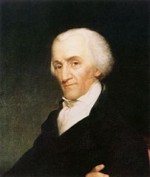Gerrymander, Jacob?
 Jacob Rees-Mogg, whom the voters of North East Somerset were foolish enough to elect as their Member of Parliament, has a reputation for not living in the present. So much of a problem that Tim Fenton of Zelo Street refers to him as “the member for times past“.
Jacob Rees-Mogg, whom the voters of North East Somerset were foolish enough to elect as their Member of Parliament, has a reputation for not living in the present. So much of a problem that Tim Fenton of Zelo Street refers to him as “the member for times past“.
It now appears Jacob has trouble in understanding the English language too.
Yesterday’s Independent carries a report on The Mogg’s speech to the far-right National Conservatism conference yesterday in which he criticised the new voter photo ID rules that were introduced in time for the recent local government elections in England, elections in which the Tories did particularly badly, losing over 1,000 council seats.
In his speech, The Mogg stated the following:
Parties that try and gerrymander end up finding their clever scheme comes back to bite them – as dare I say we found by insisting on voter ID for elections.
We found the people who didn’t have ID were elderly and they by and large voted Conservative, so we made it hard for our own voters and we upset a system that worked perfectly well.
Gerrymander, Jacob?
Voter suppression, surely?
It’s at this point that a dictionary comes in handy. The dictionary definition is “to divide an area into election districts (= areas that elect someone) in a way that gives an unfair advantage to one group or political party.”
One would have thought someone who has been a politician as long as The Mogg would know that, but poor old Jacob was badly educated, first at Westminster Under School, followed by Eton College and finally at Trinity College, Oxford.
 As regards gerrymander itself, it has an interesting etymology. It’s a portmanteau word originating from the USA in 1812. The gerry element is a reference to Elbridge Gerry, one of the country’s Founding Fathers, whilst the mander element is derived from salamander.
As regards gerrymander itself, it has an interesting etymology. It’s a portmanteau word originating from the USA in 1812. The gerry element is a reference to Elbridge Gerry, one of the country’s Founding Fathers, whilst the mander element is derived from salamander.
While Governor of Massachusetts, Gerry signed into law a bill that rearranged the state’s electoral districts to give advantage to the Democratic-Republican Party, although Gerry himself was said to disapprove of the practice. When mapped, one of the contorted districts in the Boston area was said to resemble a mythological salamander. Thus the term was born with its spread and popularity sustained by a political cartoon depicting a strange animal with claws, wings and a dragon-like head that supposedly resembled the oddly shaped district.